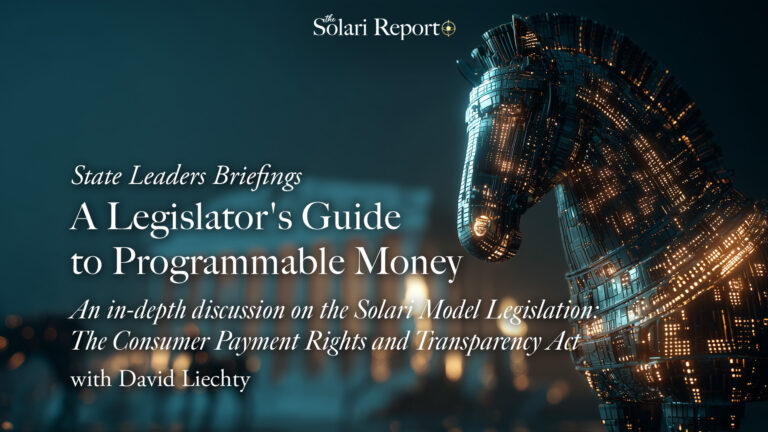
Gold Standard Covid Science in Practice – An Interdisciplinary Symposium V: In the Midst of Darkness Light Prevails
Become a member: Subscribe
- Money & Markets
- Weekly Solari Reports
- Cognitive Liberty
- Young Builders
- Ask Catherine
- News Trends & Stories
- Equity Overview
- War For Bankocracy
- Digital Money, Digital Control
- State Leader Briefings
- Food
- Food for the Soul
- Future Science
- Health
- Metanoia
- Solutions
- Spiritual Science
- Wellness
- Building Weatlh
- Via Europa
Solari’s Building Wealth materials are organized to inspire and support your personal strategic and financial planning.

Missing Money
Articles and video discussions of the $21 Trillion dollars missing from the U.S. government
No posts
- LATEST
- TOP SECTIONS
- SERIES
- Money & Markets
- Weekly Solari Reports
- Ask Catherine
- News Trends & Stories
- Equity Overview
- Cognitive Liberty
- Young Builders
- Building Wealth
- The War for Bankocracy
- Digital Money, Digital Control
- State Leader Briefings
- Food
- Food for the Soul
- Future Science
- Health
- Metanoia
- Solutions
- Spiritual Science
- Wellness
- Via Europa
- BLOGS
- RESOURCES
- COMMUNITY
- My Account
- Log In
- Subscribe
- Search
- Shop
- Support
- Donate
- Log Out
Gold Standard Covid Science in Practice – An Interdisciplinary Symposium V: In the Midst of Darkness Light Prevails

This is a five session Symposium covering a wide range of Covid-19 revelations. Speakers include:
- Sucharit Bhakdi
- Michael Palmer
- Brian Hooker
- Meryl Nass
- Philipp Kruse
- Renate Holzeisen
- Ros Jones
- Ray L. Flores
- Catherine Austin Fitts
- Carolyn A. Betts
- Sasha Latypova
- Meryl Nass
- John Titus
- Corey Lynn
- Taylor Hudák
- Thomas Binder
- Aga Wilson
- Ryan Cole
- Liz Evans
- Daniel Broudy
- Valerie Kyrie
- David Hughes
- Wolfgang Wodarg
- Polly Tommey
See original post here.
2 Comments
Comments are closed.
Our mission is to help you live a free and inspired life. This includes building wealth in ways that build real wealth in the wider economy. We believe that personal and family wealth is a critical ingredient of both individual freedom and community, health and well-being.
Nothing on The Solari Report should be taken as individual investment, legal, or medical advice. Anyone seeking investment, legal, medical, or other professional advice for his or her personal situation is advised to seek out a qualified advisor or advisors and provide as much information as possible to the advisor in order that such advisor can take into account all relevant circumstances, objectives, and risks before rendering an opinion as to the appropriate strategy.
Be the first to know about new articles, series and events.

2 Comments
-
A new Gallup poll found that 52% of Americans believe the quality of US health care is “only fair” or “poor,” marking the first time in the survey’s two decades that the share of adults giving “good” or “excellent” ratings to the nation’s health care dropped below half to 48%. Almost 50% of respondents said there are major problems in US health care, while 20% believe the nation’s health care is in a “state of crisis,” the largest percentage in about a decade. Full Story: CNN (1/19), United Press International (1/19)
-
Survey: Patients unsure about data access, ownership
Fifteen percent of patients in the US responding to a survey said they didn’t know whether they had access to their own health data, more than two-thirds were unsure where their data is stored, and 74% said they want better access to health data. The survey, conducted by Propeller Insights for Carta Healthcare, also revealed consumer confusion about health data ownership, with 47% saying they own their health data, 24% saying the health care facility owns their data, 16% saying the clinician owns their data, and 13% believing the registry where data is stored owns it. Full Story: Patient Engagement HIT (1/19)
Comments are closed.



















































































































A new Gallup poll found that 52% of Americans believe the quality of US health care is “only fair” or “poor,” marking the first time in the survey’s two decades that the share of adults giving “good” or “excellent” ratings to the nation’s health care dropped below half to 48%. Almost 50% of respondents said there are major problems in US health care, while 20% believe the nation’s health care is in a “state of crisis,” the largest percentage in about a decade. Full Story: CNN (1/19), United Press International (1/19)
Survey: Patients unsure about data access, ownership
Fifteen percent of patients in the US responding to a survey said they didn’t know whether they had access to their own health data, more than two-thirds were unsure where their data is stored, and 74% said they want better access to health data. The survey, conducted by Propeller Insights for Carta Healthcare, also revealed consumer confusion about health data ownership, with 47% saying they own their health data, 24% saying the health care facility owns their data, 16% saying the clinician owns their data, and 13% believing the registry where data is stored owns it. Full Story: Patient Engagement HIT (1/19)